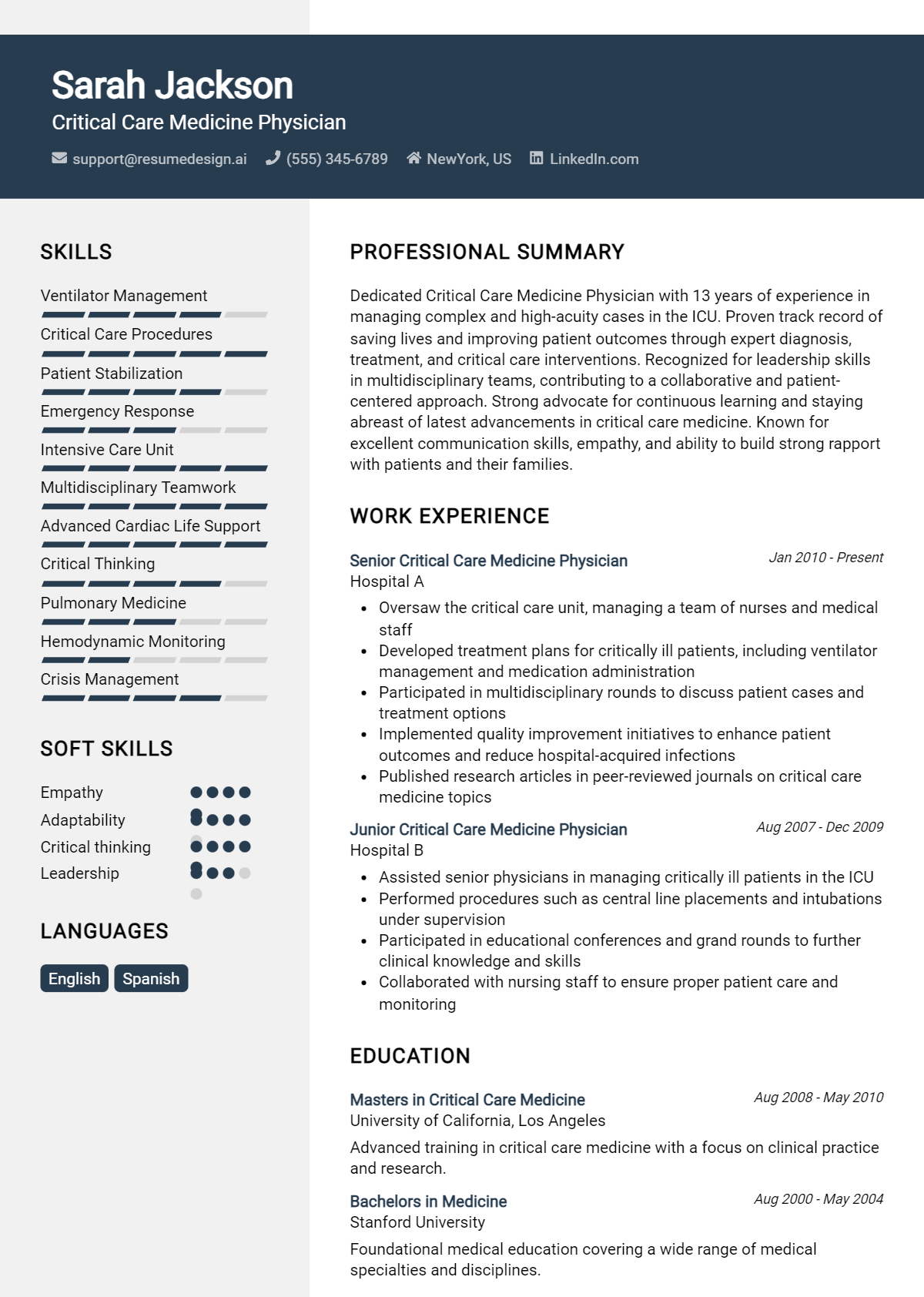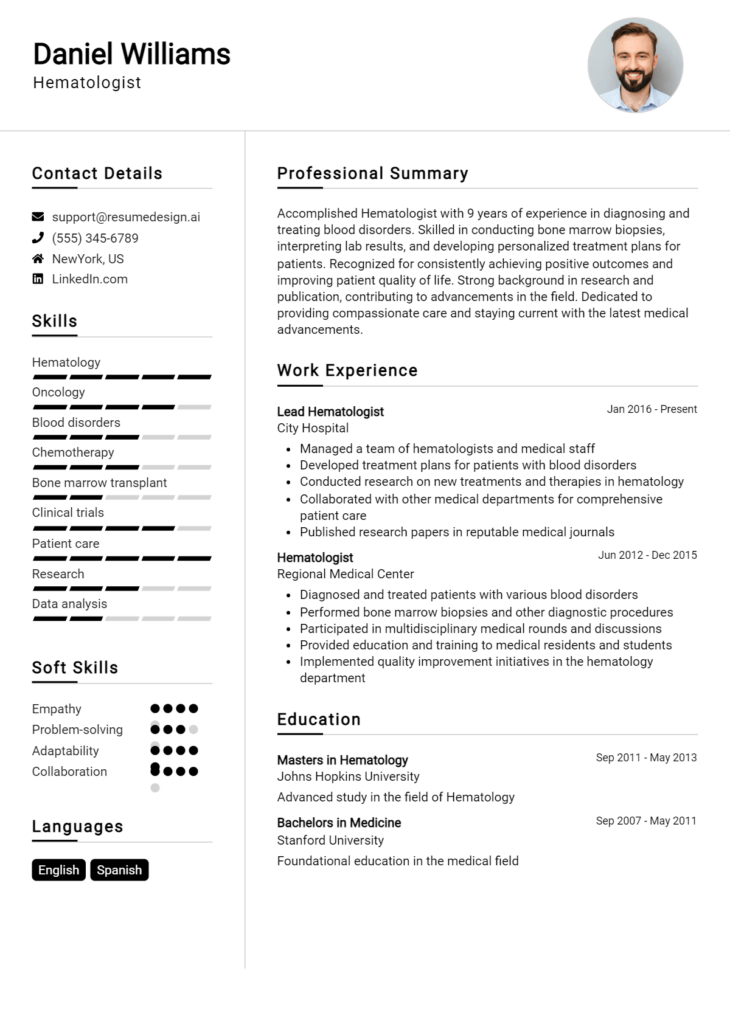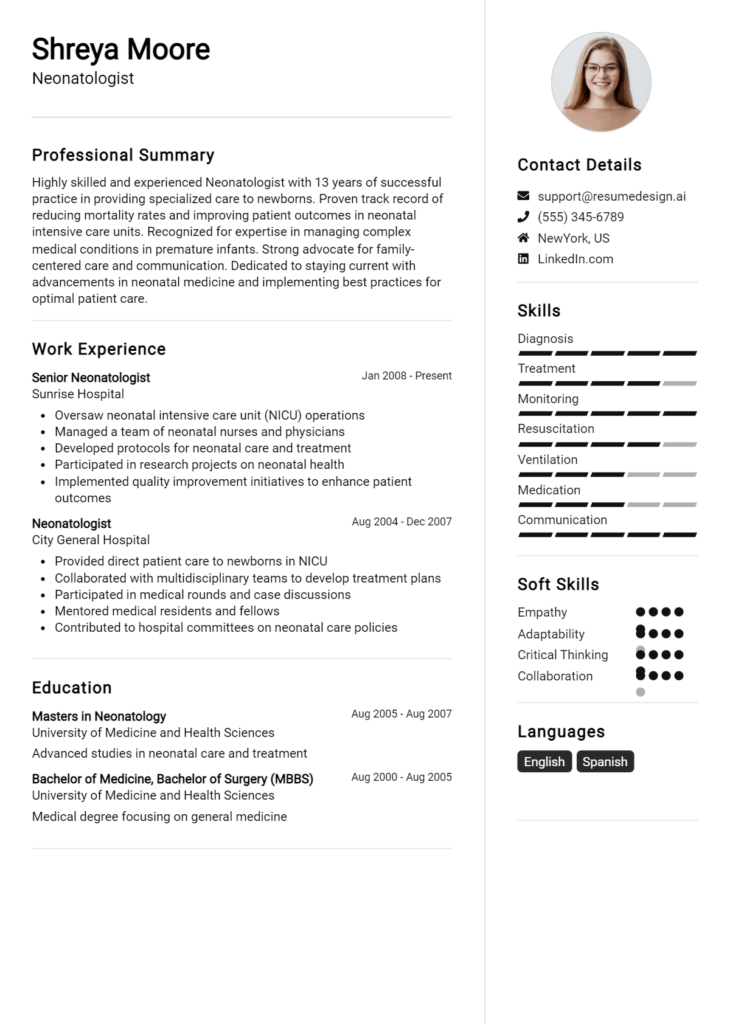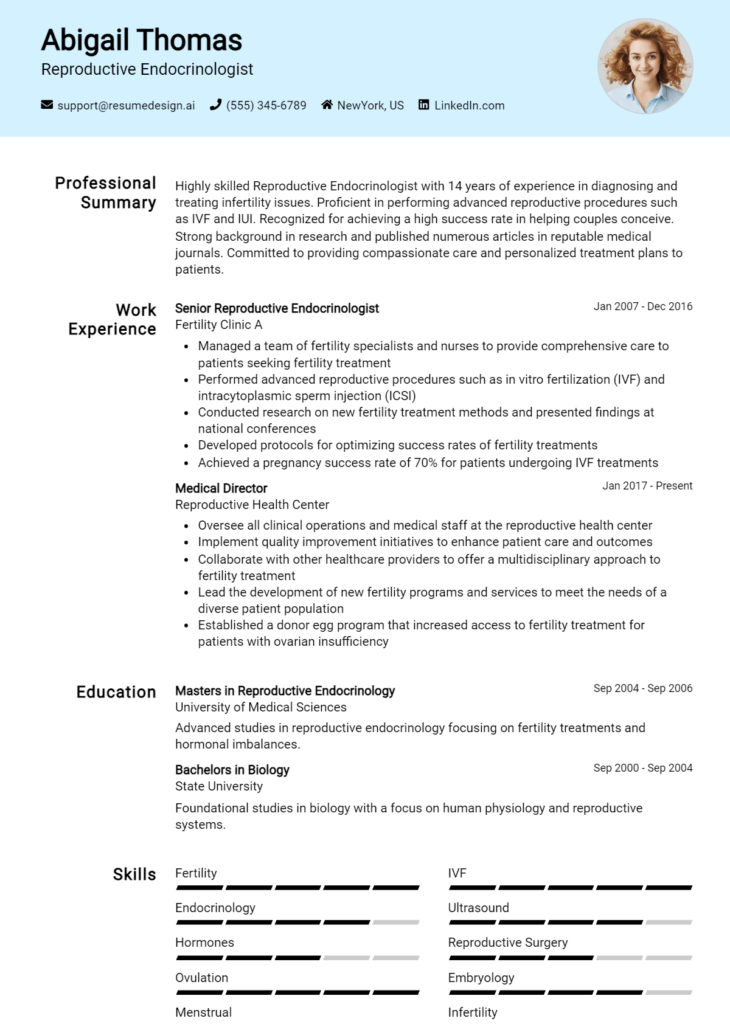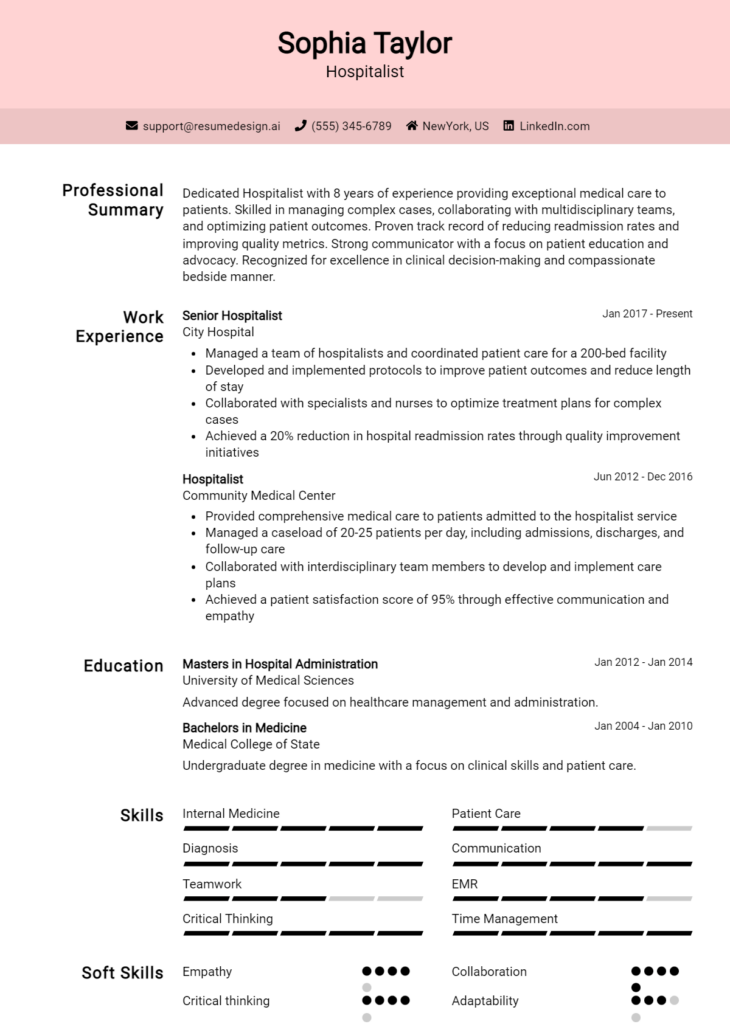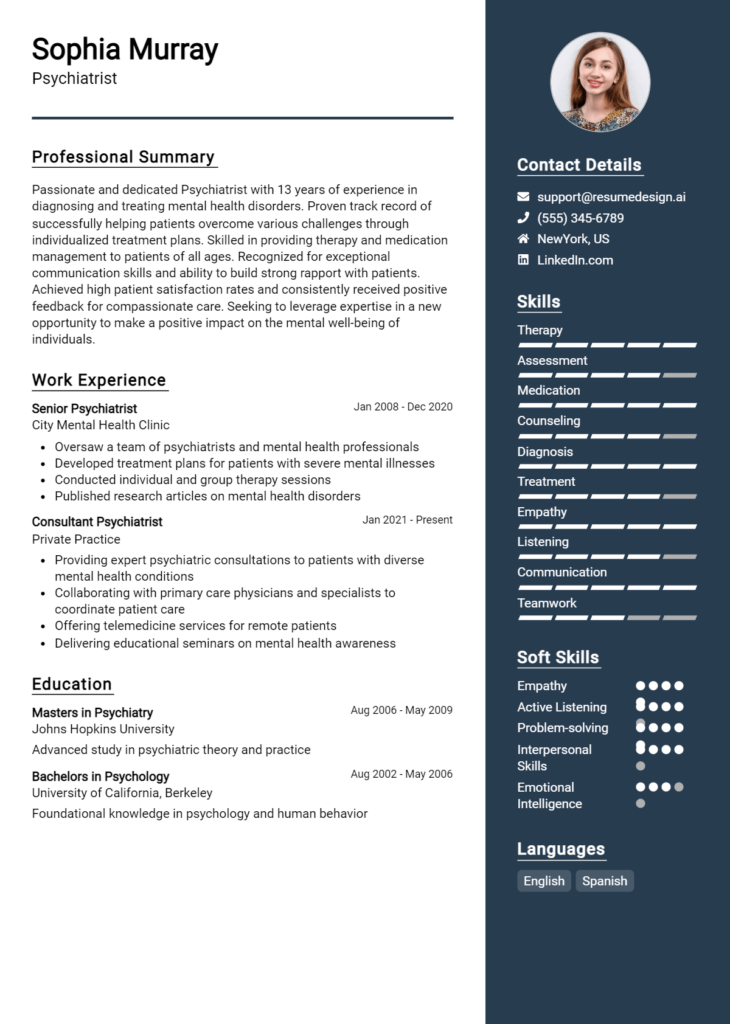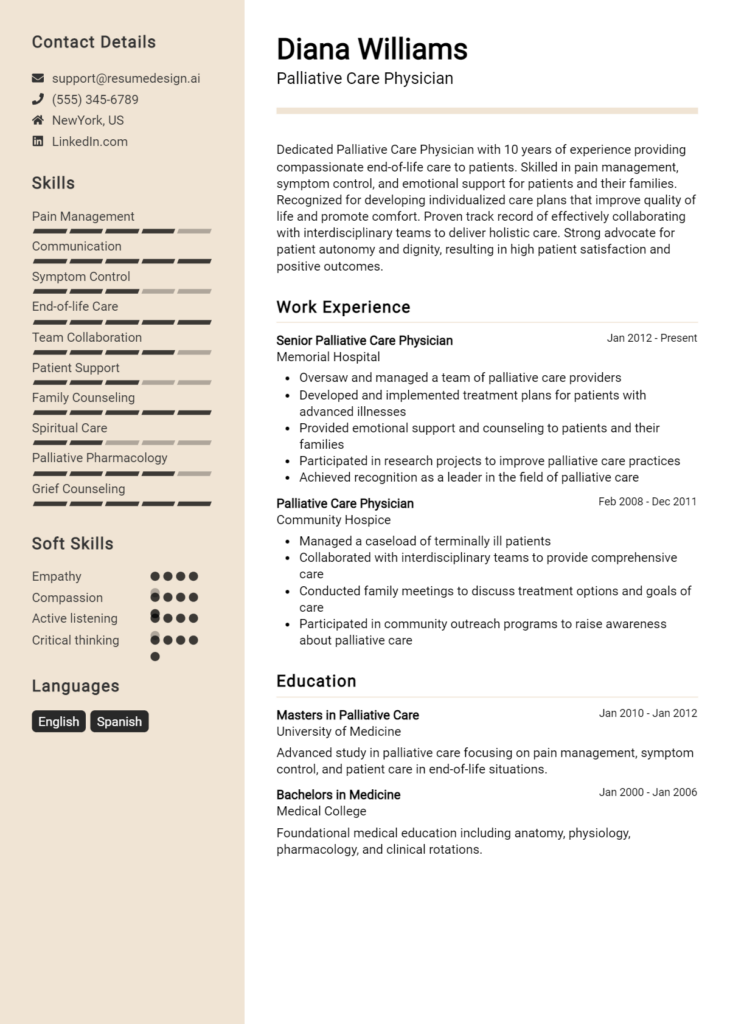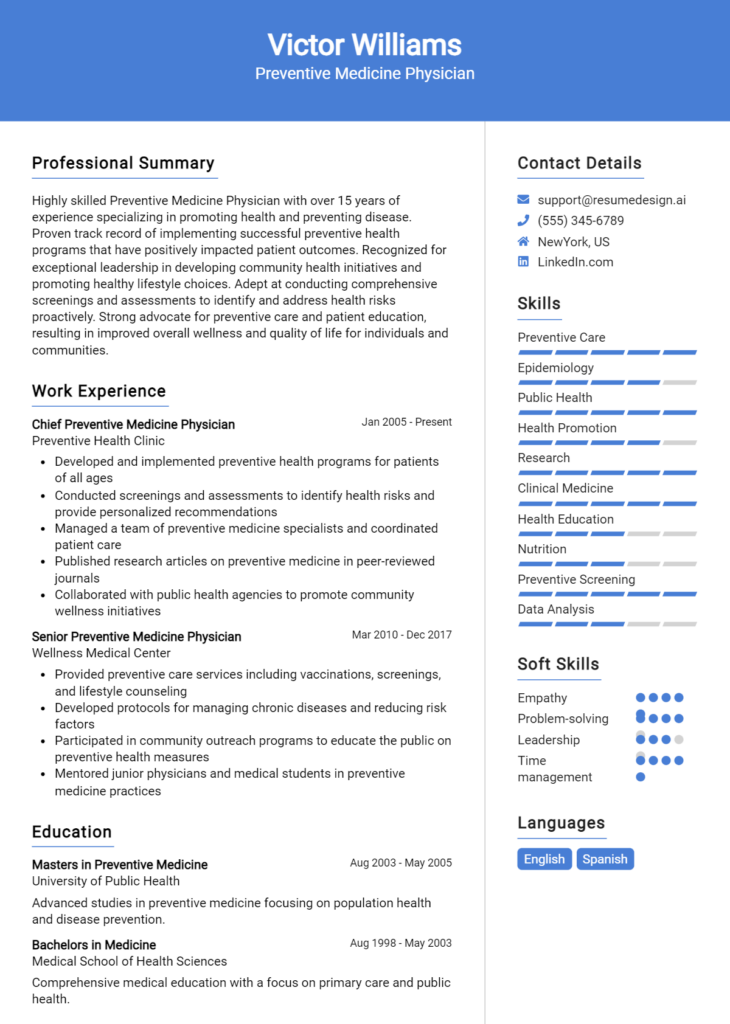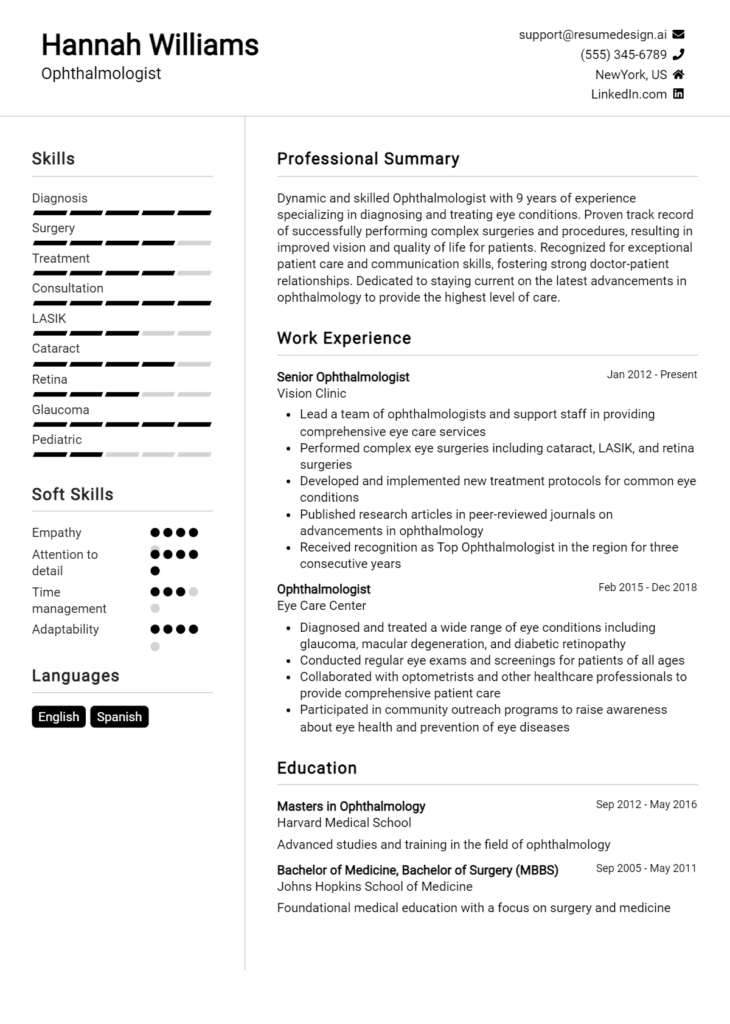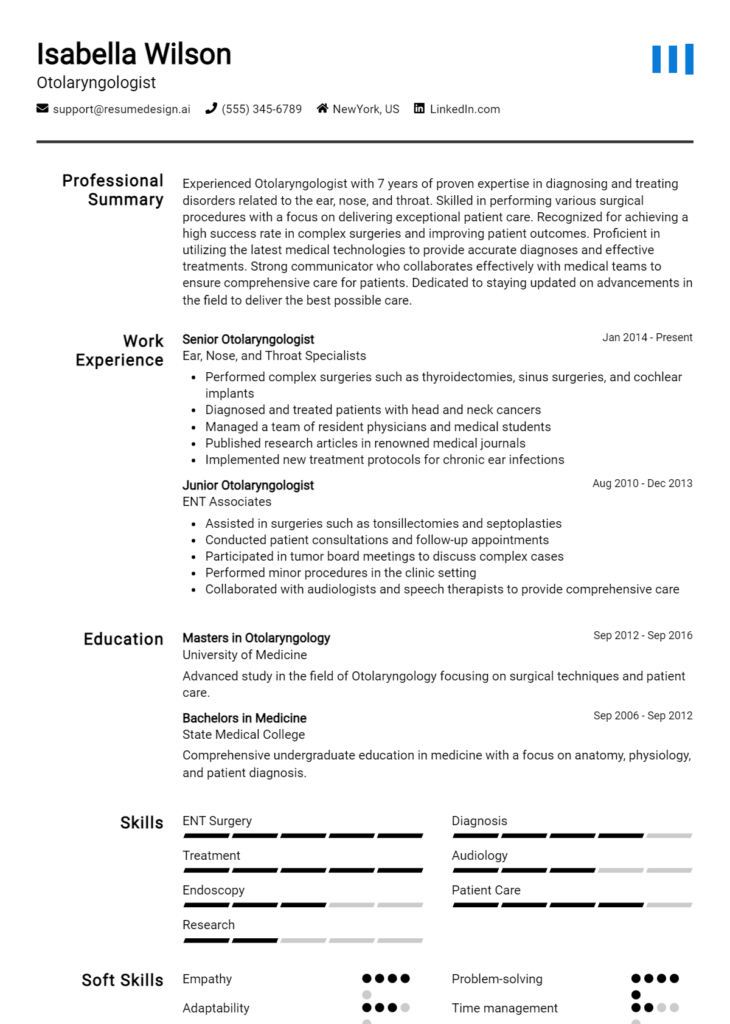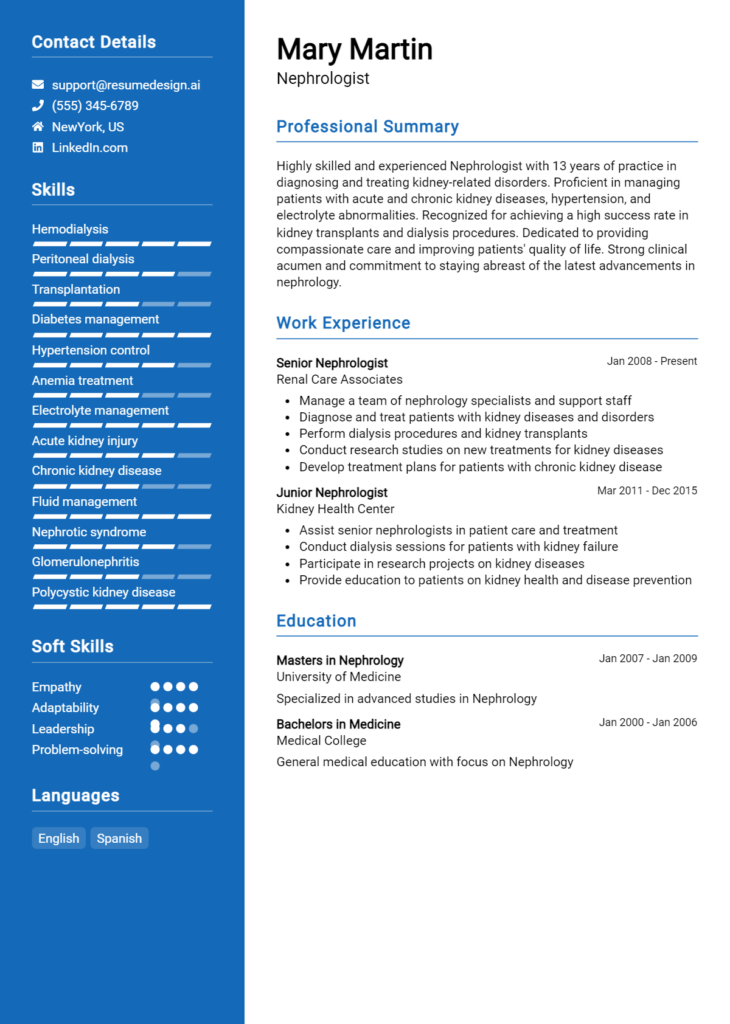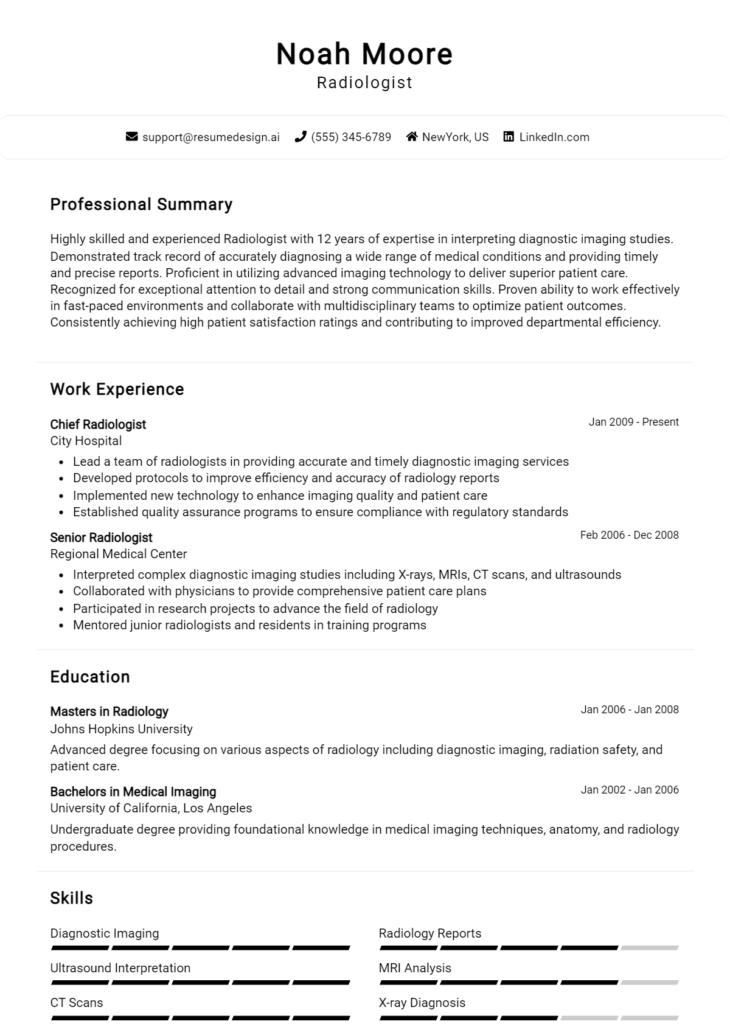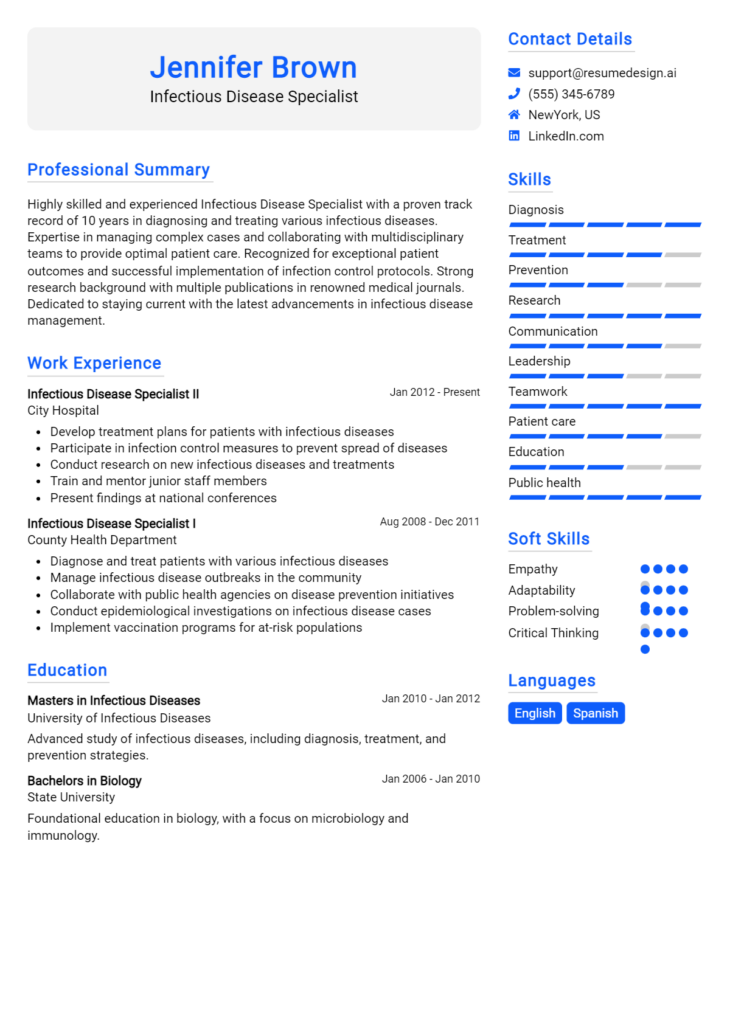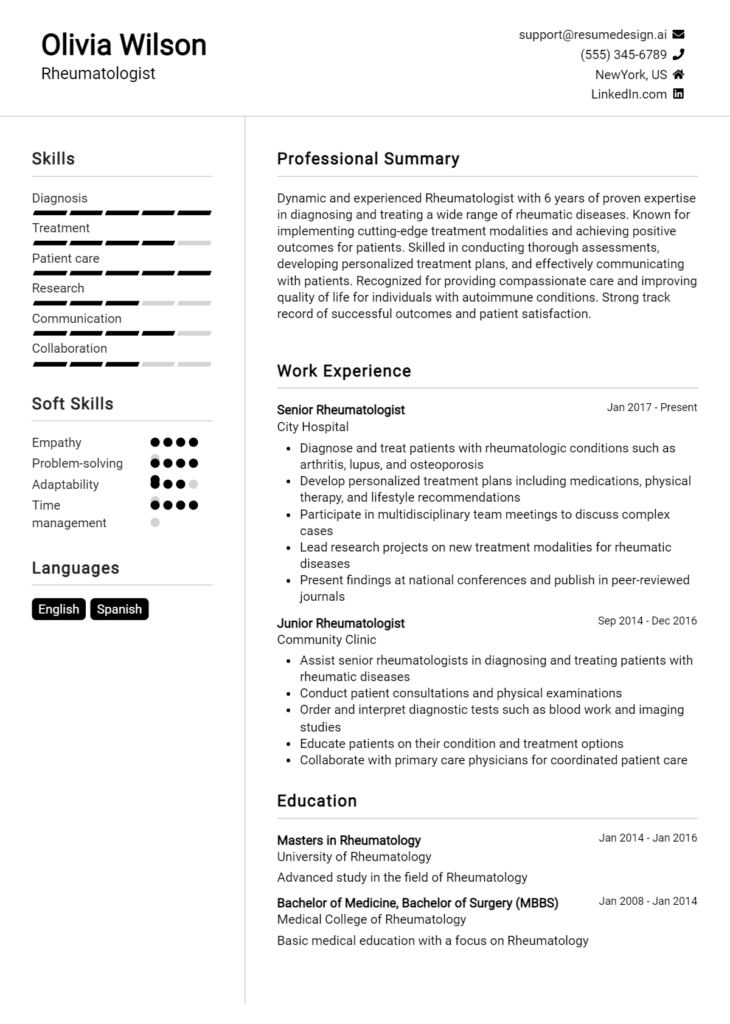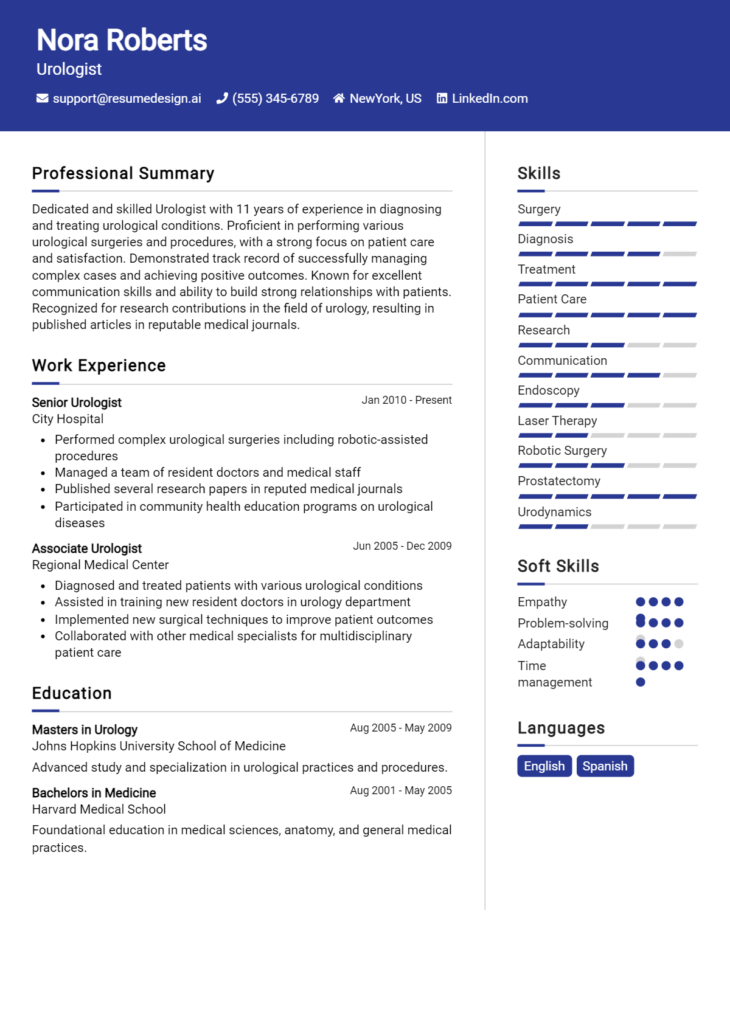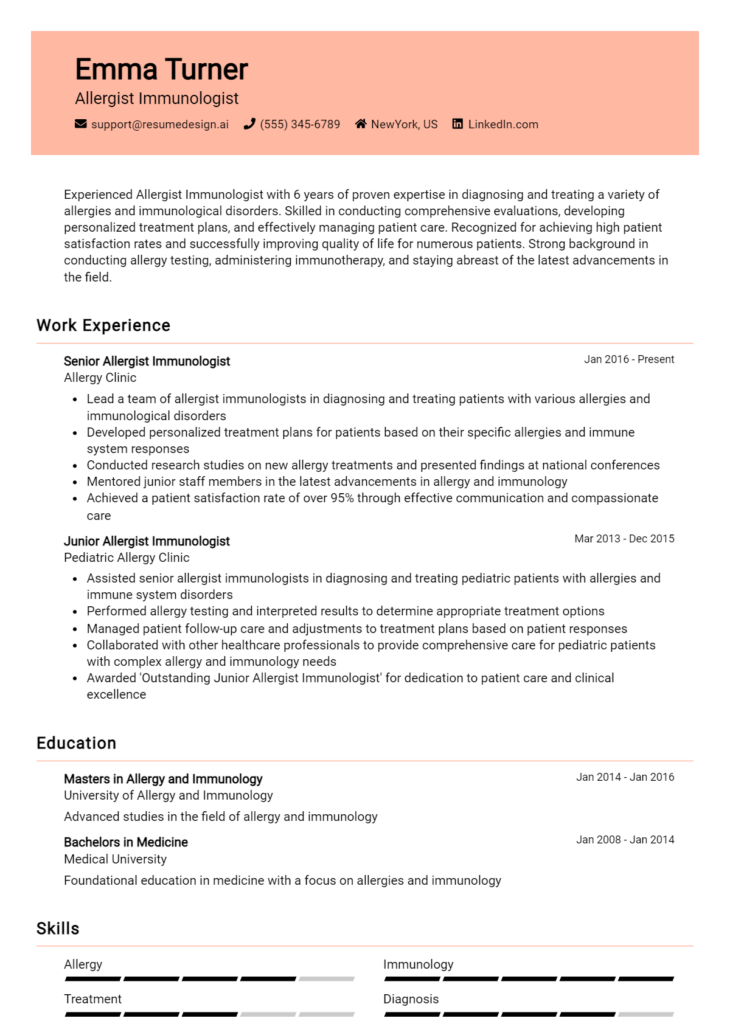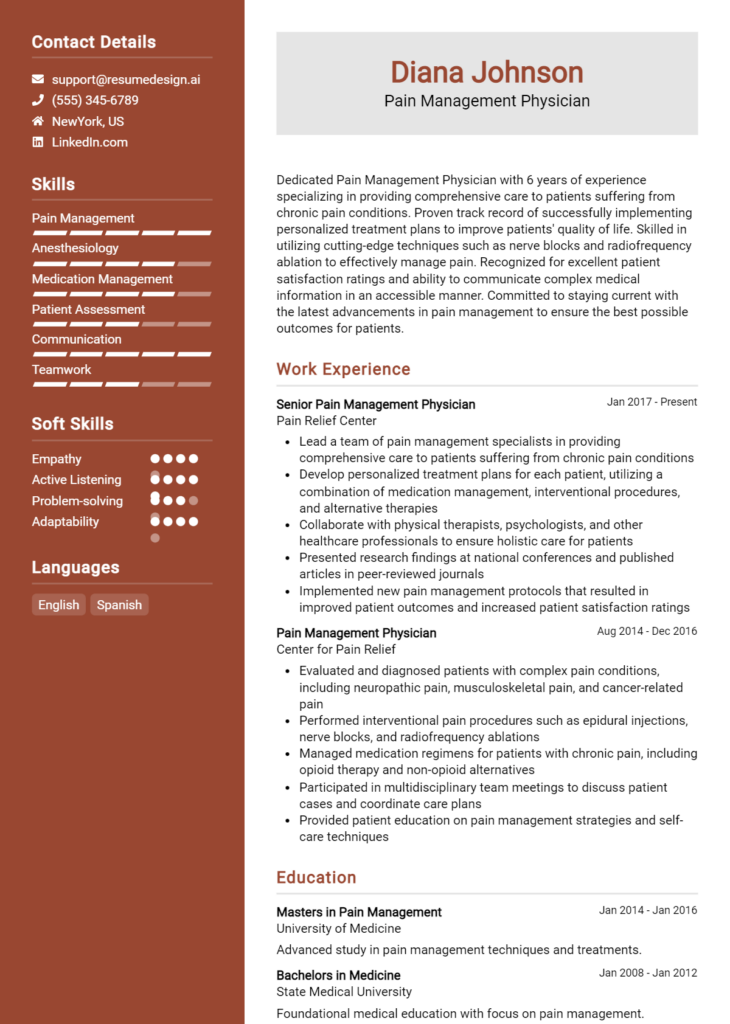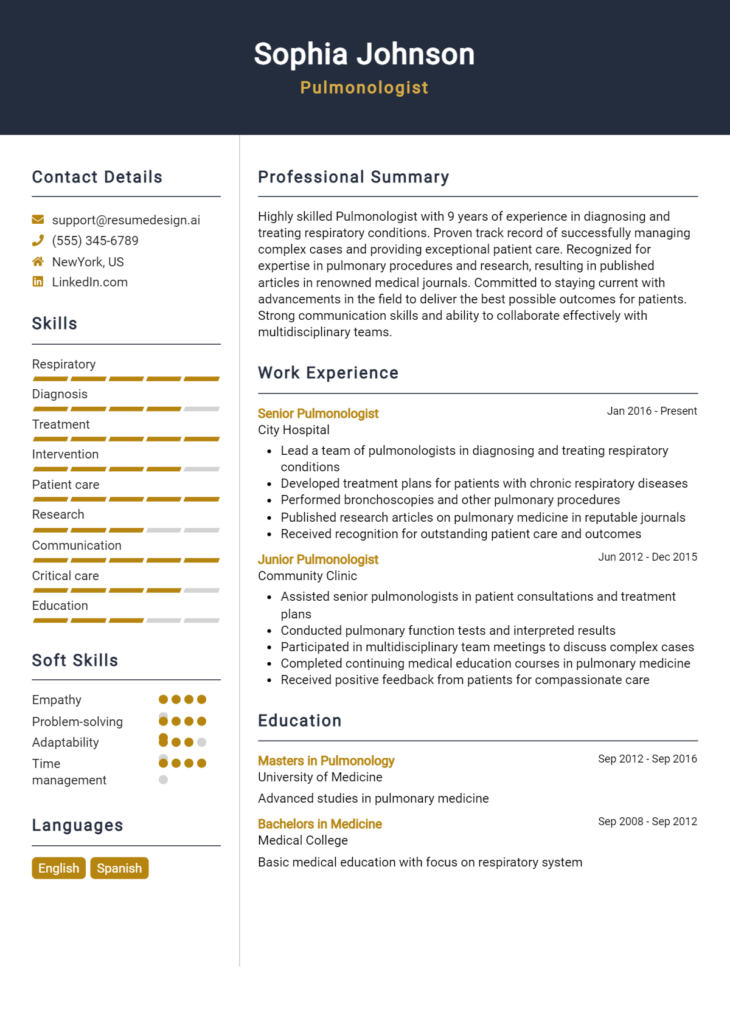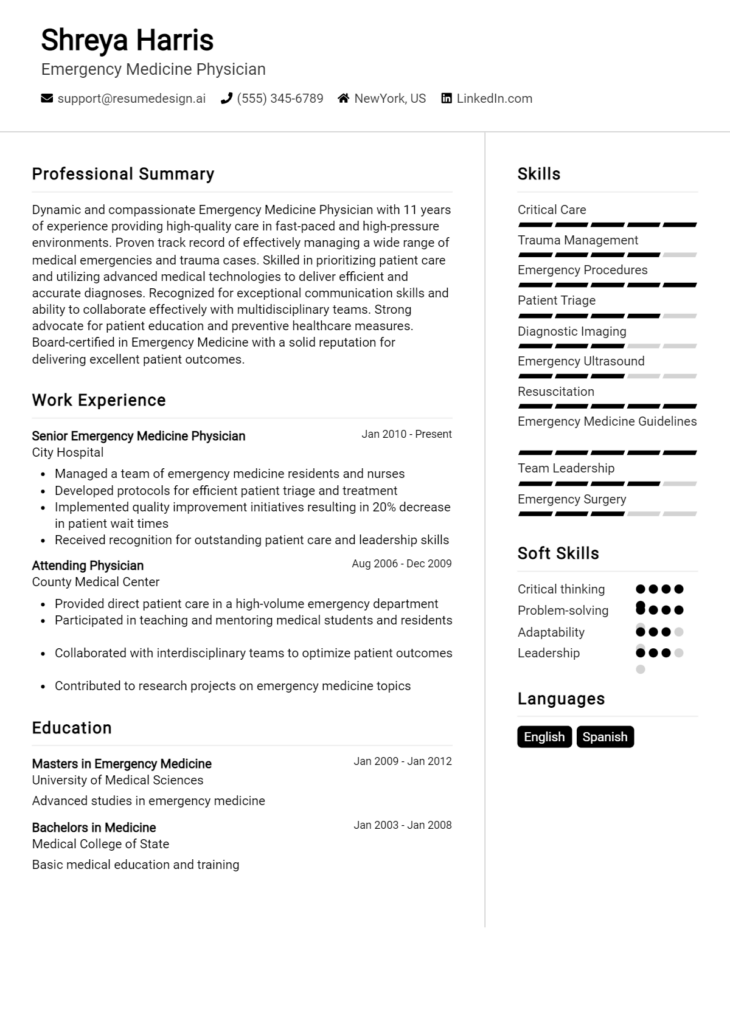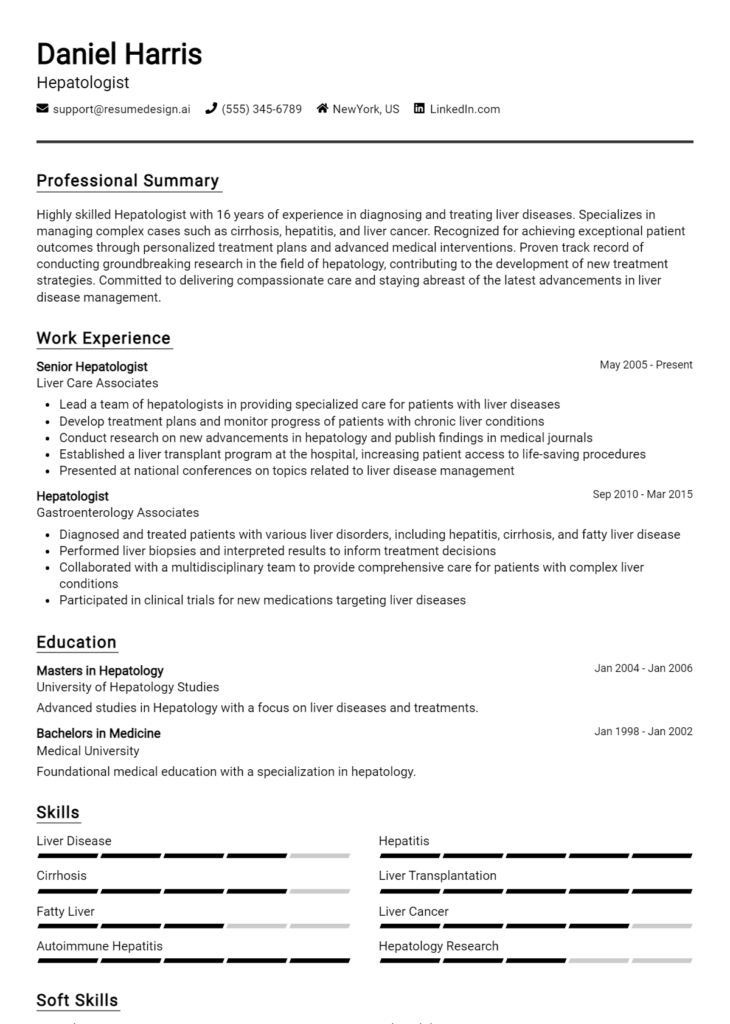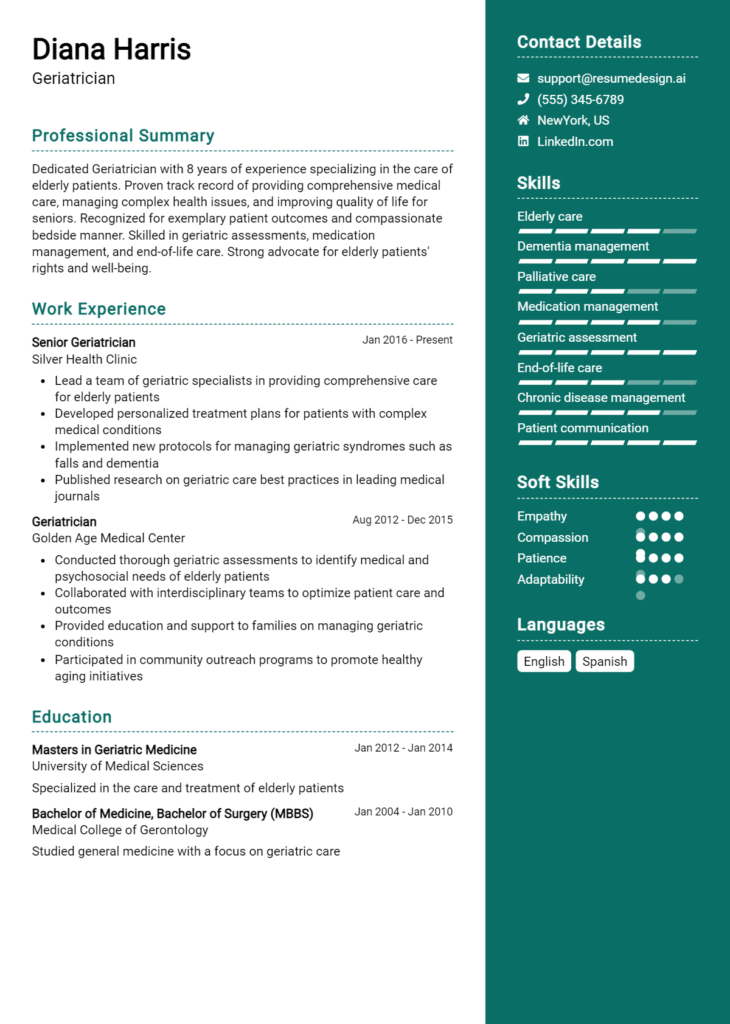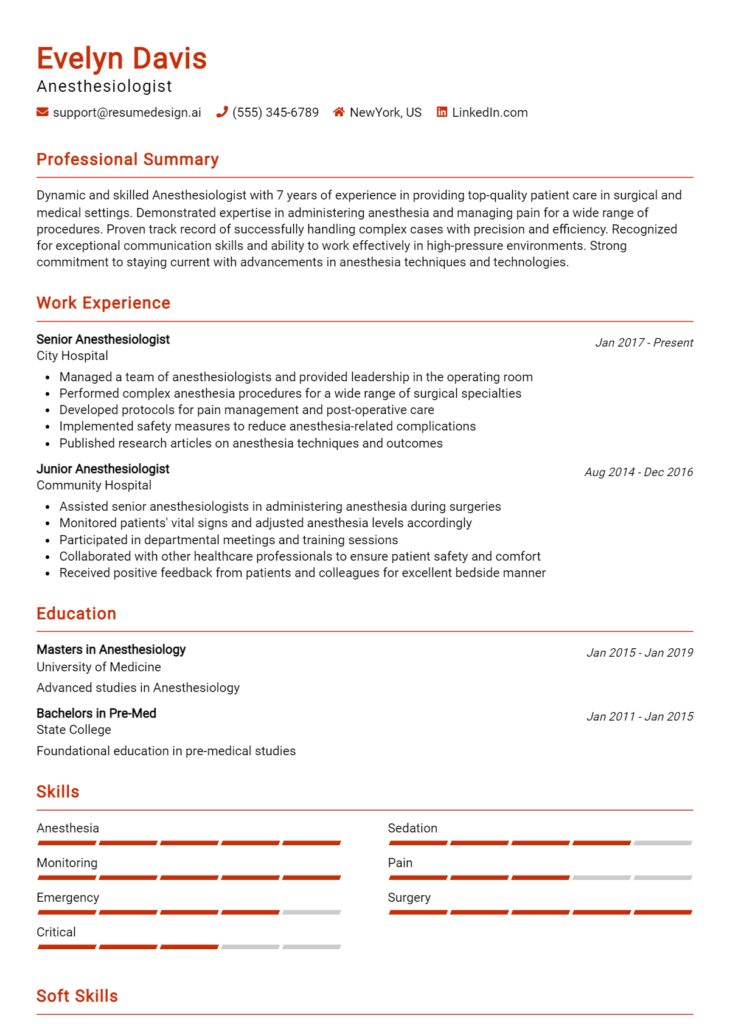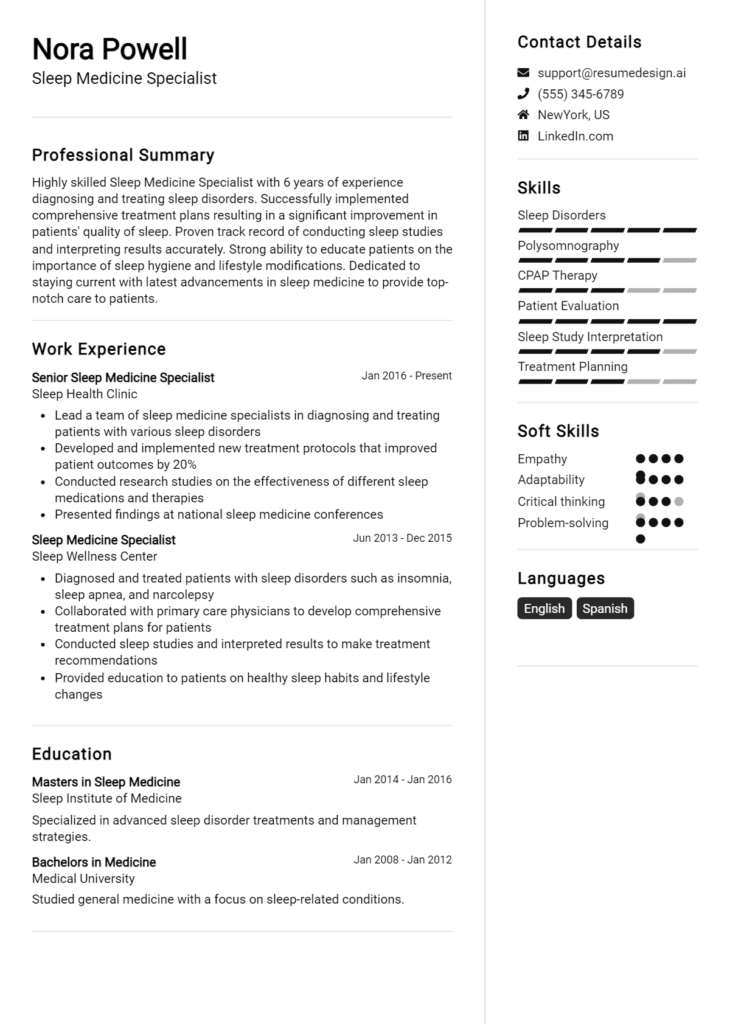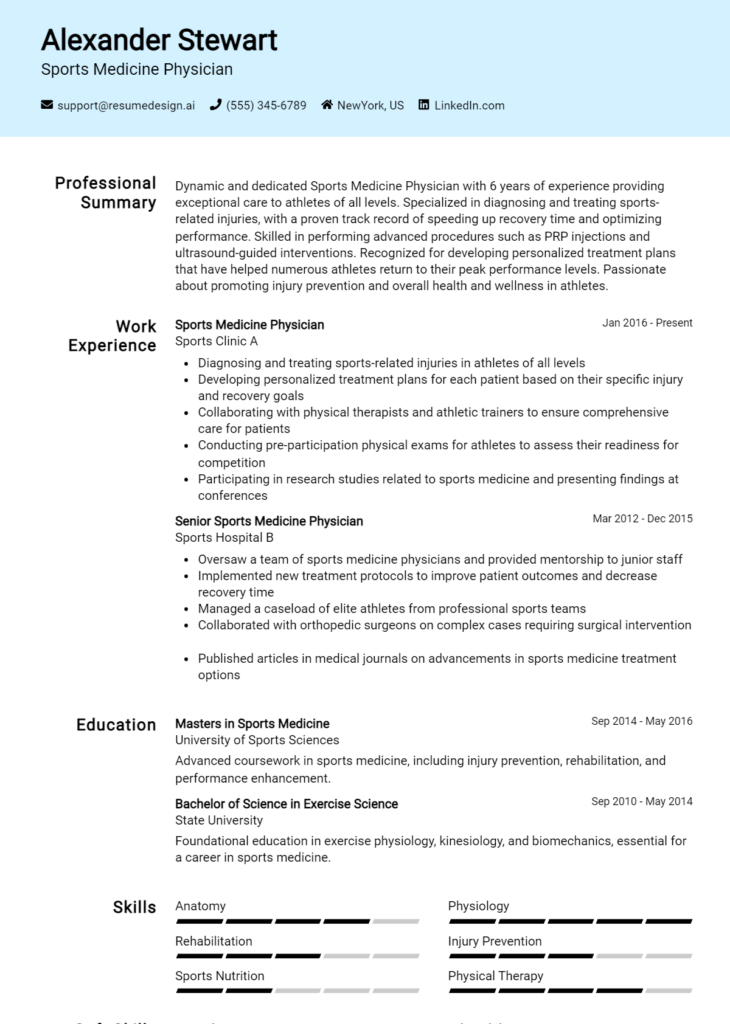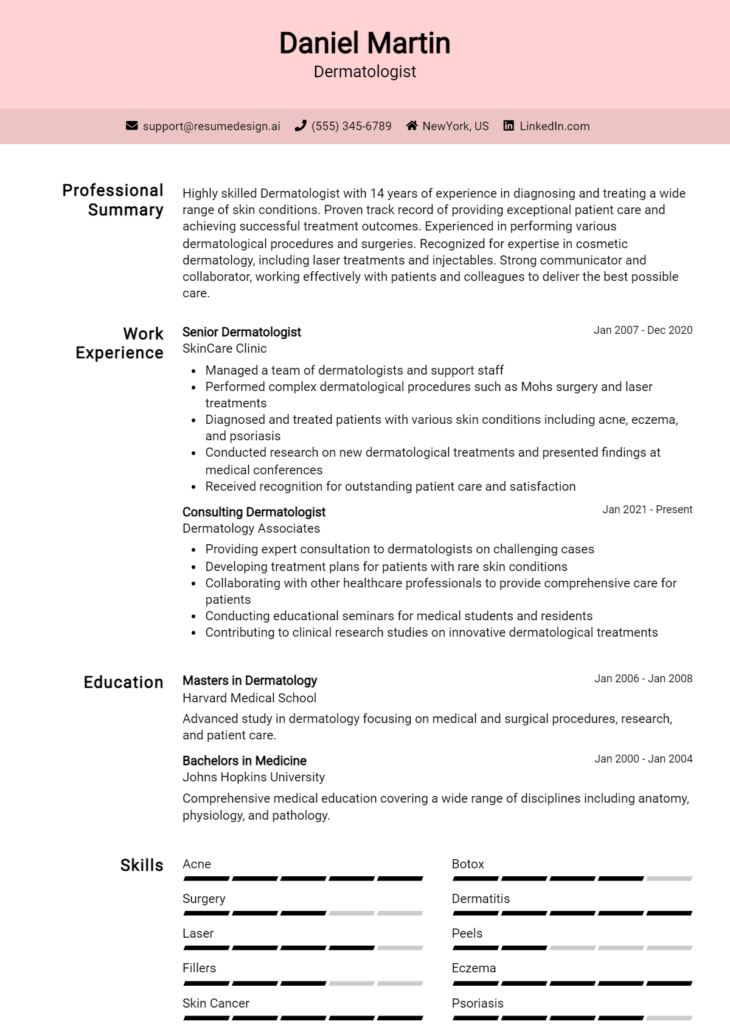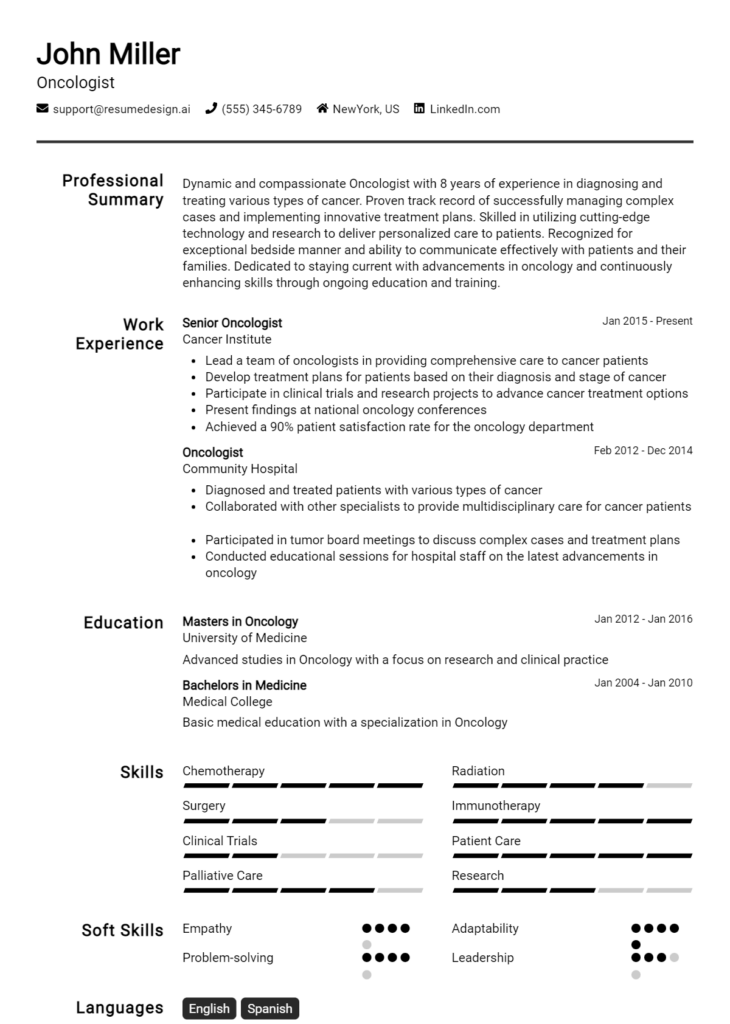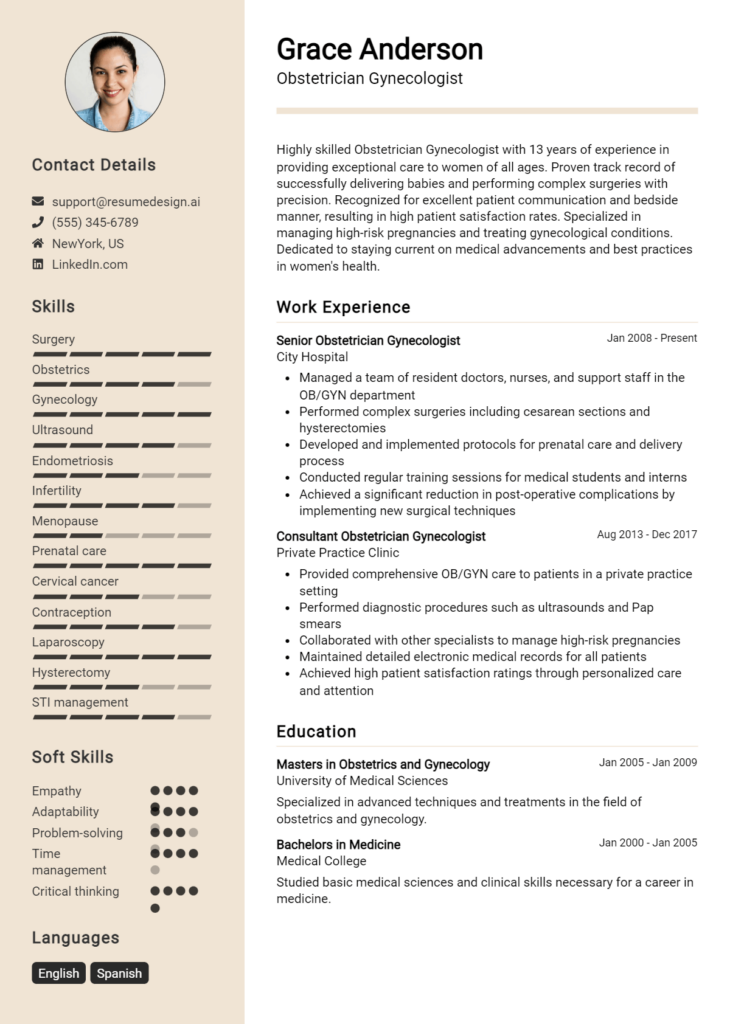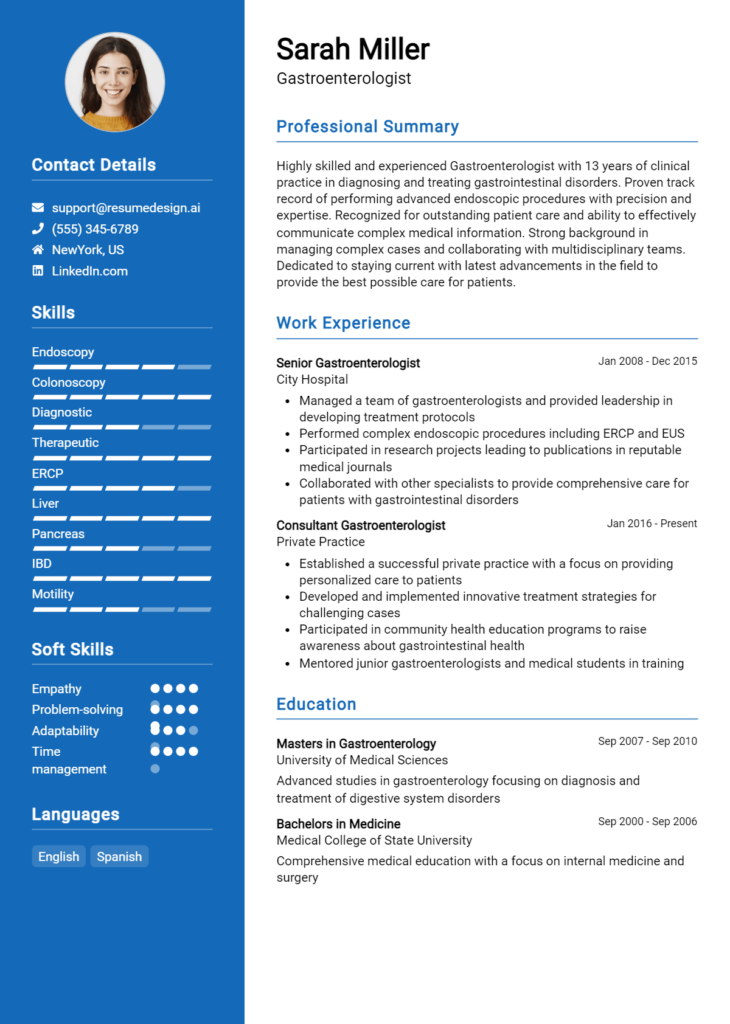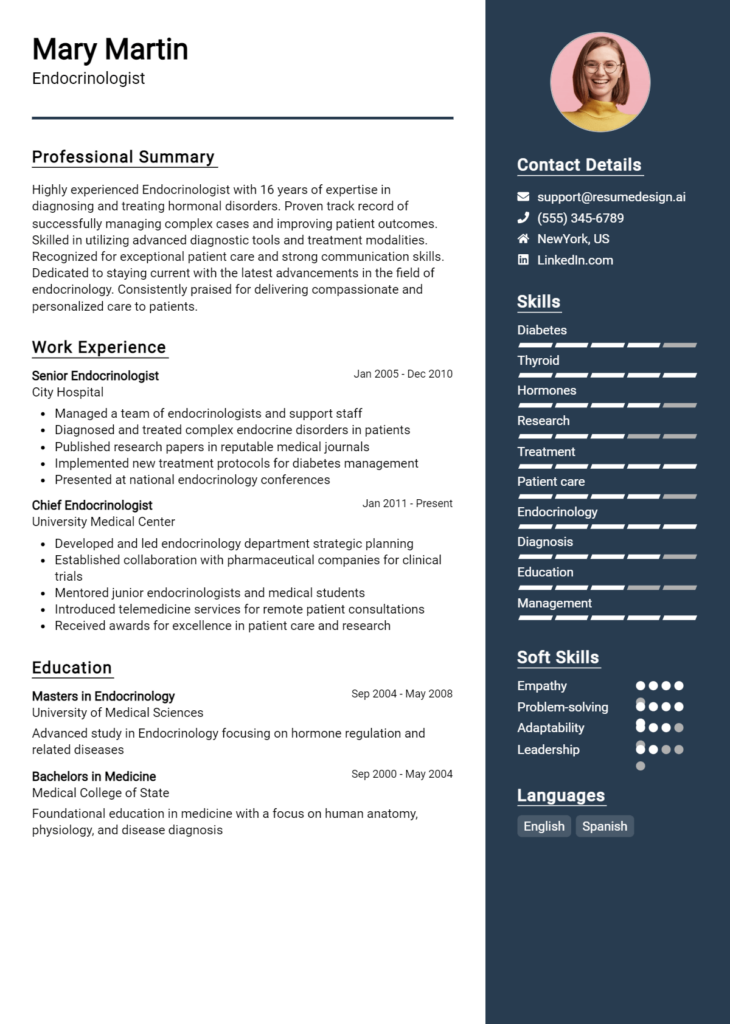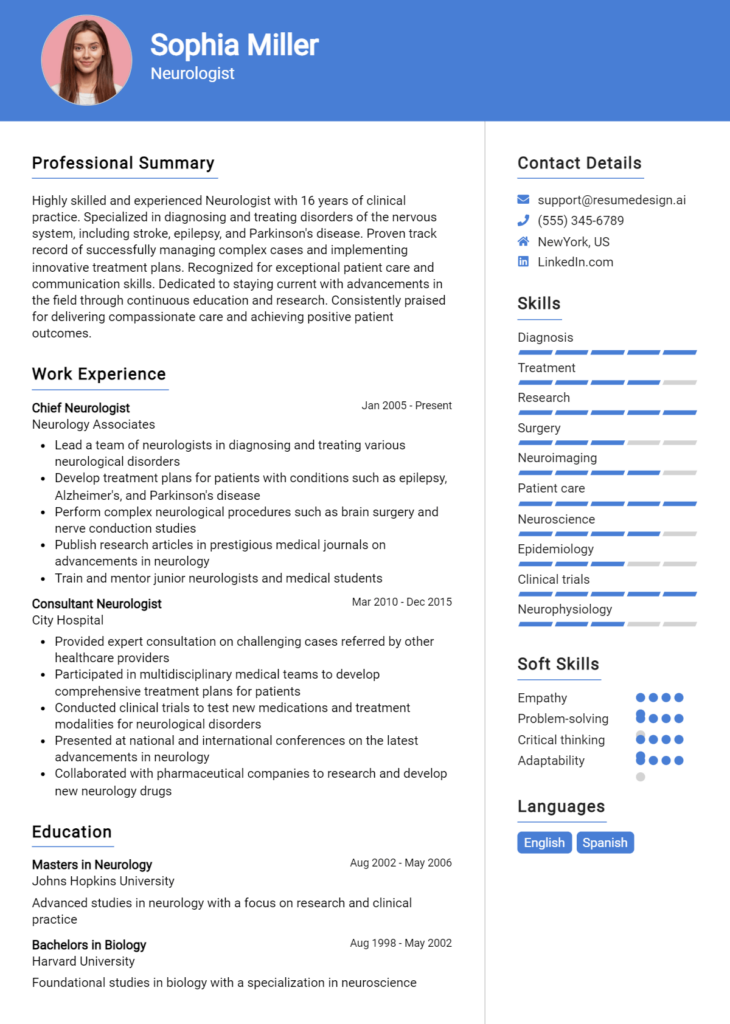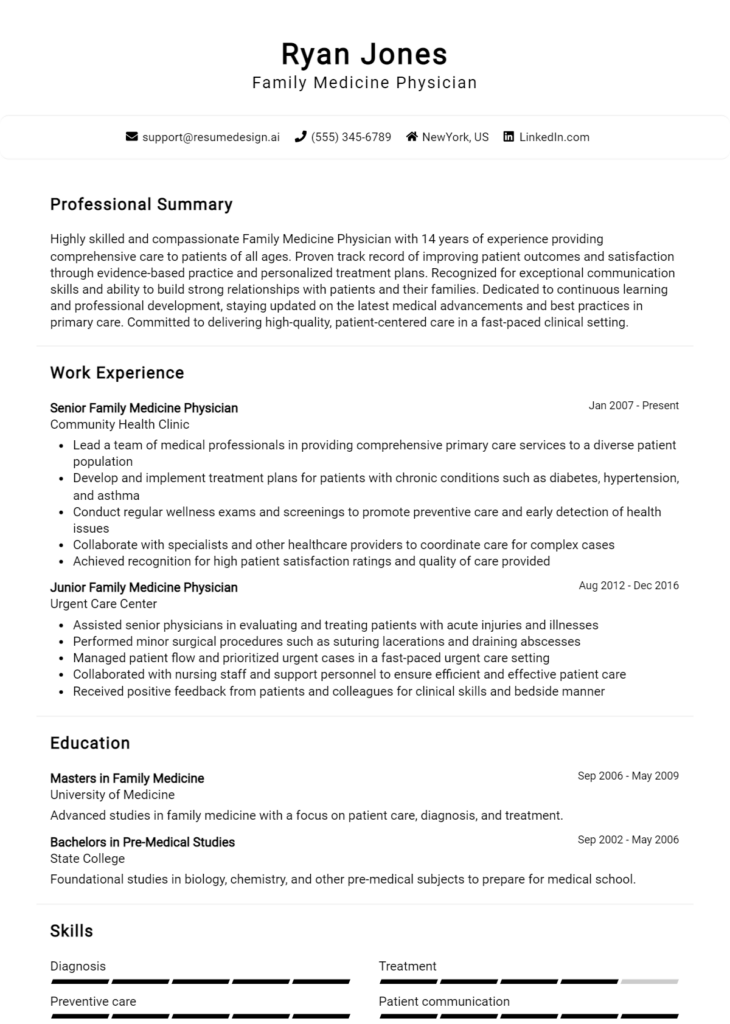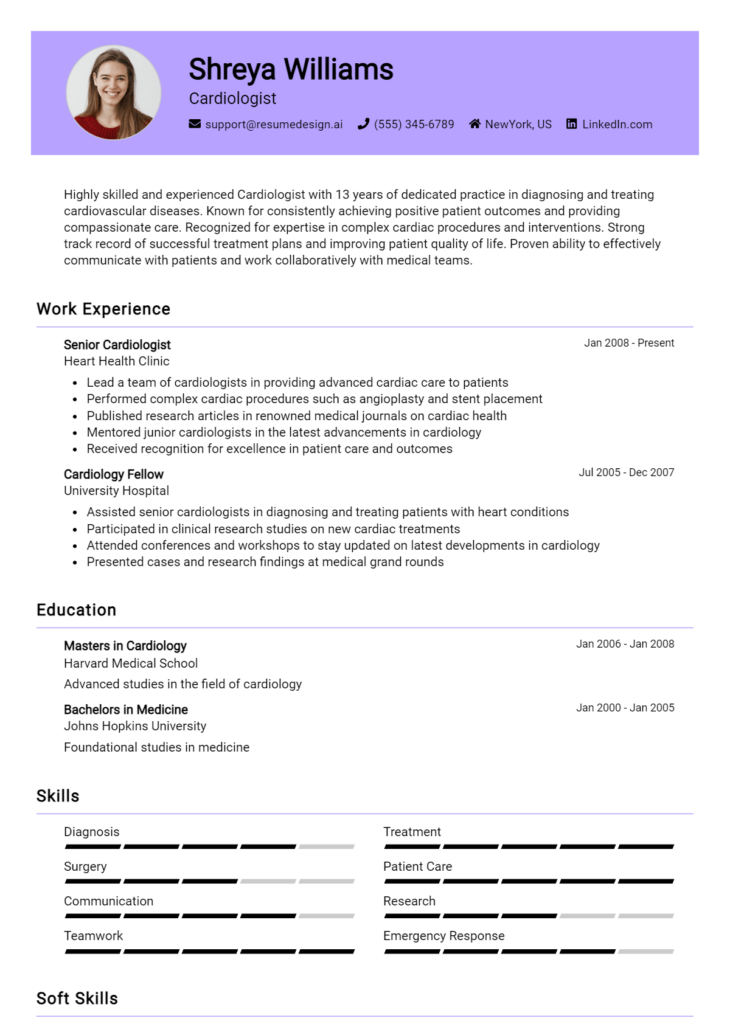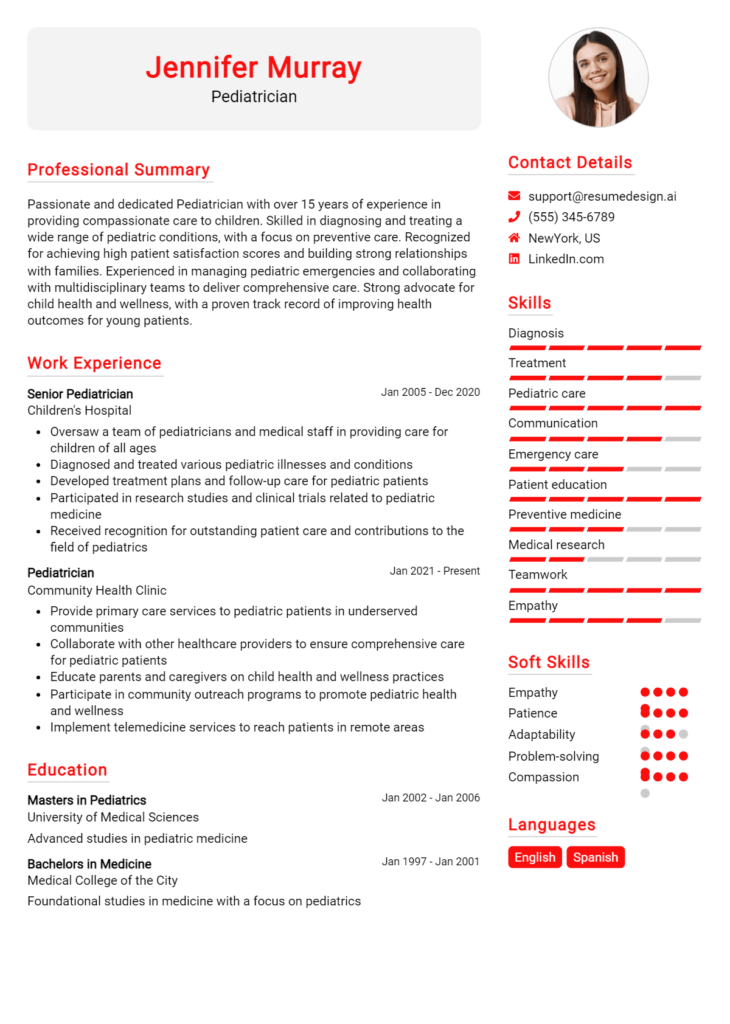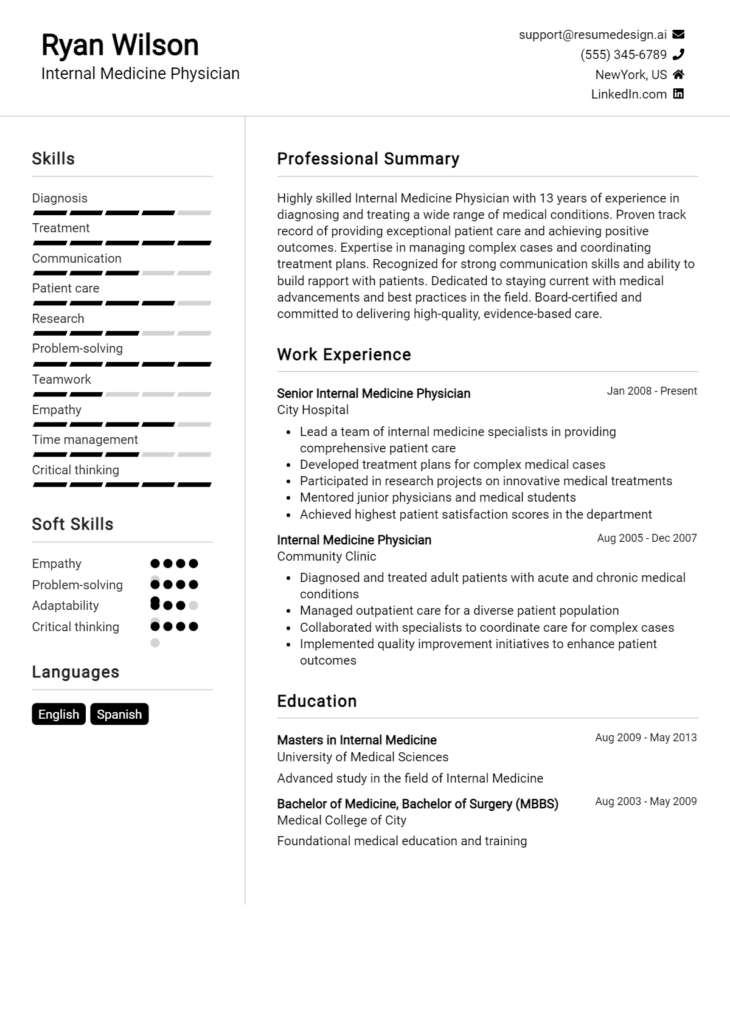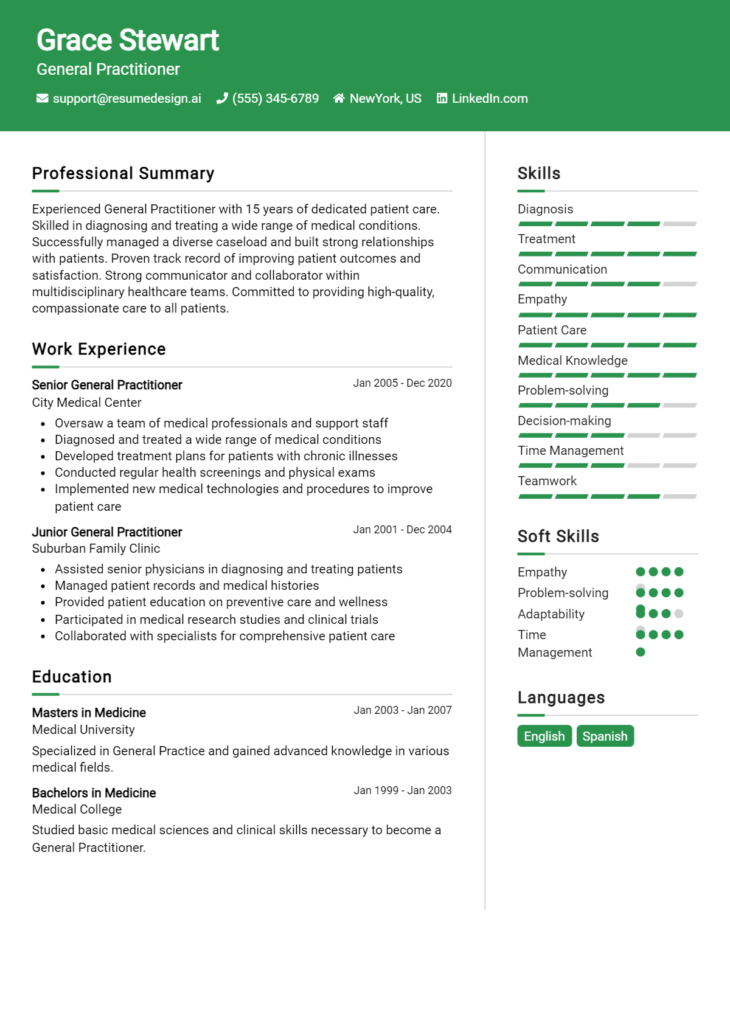Critical Care Medicine Physician Core Responsibilities
A Critical Care Medicine Physician is essential in managing patients with life-threatening conditions, coordinating care across multiple departments such as surgery, respiratory therapy, and nursing. This role demands exceptional technical skills, operational understanding, and strong problem-solving abilities to make rapid decisions in high-pressure environments. Effective communication and teamwork are crucial for delivering optimal patient outcomes and meeting organizational goals. A well-structured resume can effectively showcase these qualifications, making a candidate stand out in the competitive field of critical care.
Common Responsibilities Listed on Critical Care Medicine Physician Resume
- Conducting comprehensive assessments of critically ill patients.
- Developing and implementing individualized treatment plans.
- Managing life-support equipment and monitoring systems.
- Collaborating with multidisciplinary teams to optimize patient care.
- Performing procedures such as intubation and central line placement.
- Overseeing the administration of medications and therapies.
- Educating patients and families about critical care processes.
- Participating in quality improvement initiatives and protocols.
- Documenting patient progress and treatment outcomes accurately.
- Providing mentorship and training to junior medical staff.
- Conducting research to advance critical care practices.
- Ensuring compliance with healthcare regulations and standards.
High-Level Resume Tips for Critical Care Medicine Physician Professionals
In the competitive field of Critical Care Medicine, a well-crafted resume is essential for making a strong first impression on potential employers. As the initial touchpoint between a candidate and a hiring team, a resume must effectively showcase not only the applicant's skills but also their significant achievements in a high-stakes environment. It is crucial for Critical Care Medicine Physician professionals to articulate their unique qualifications and experiences in a manner that resonates with hiring managers. This guide will provide practical and actionable resume tips specifically tailored for this specialized field, enabling candidates to present themselves as the ideal fit for critical care roles.
Top Resume Tips for Critical Care Medicine Physician Professionals
- Tailor your resume to each job description, emphasizing the skills and experiences that align with the specific requirements of the position.
- Highlight relevant clinical experiences, including rotations, fellowships, and any specialized training in critical care medicine.
- Quantify your achievements by including metrics such as patient outcomes, length of stays, or improvements in care processes to demonstrate your impact.
- Showcase your proficiency in advanced medical technologies and procedures relevant to critical care, such as intubation, ventilator management, and ECMO.
- Include certifications and licensure that are pertinent to the role, such as ACLS, BLS, or board certification in Critical Care Medicine.
- Use action verbs to describe your experiences, ensuring that your contributions are presented in a dynamic and engaging manner.
- Incorporate professional development activities, such as conferences, workshops, or research projects, to illustrate your commitment to continuous learning.
- Emphasize teamwork and collaboration skills, as working effectively with multidisciplinary teams is vital in critical care settings.
- Keep your resume concise and focused, ideally within one to two pages, to maintain the reader's attention and highlight key points effectively.
- Proofread thoroughly to eliminate any errors or inconsistencies, as attention to detail is crucial in both your resume and your medical practice.
By implementing these tips, Critical Care Medicine Physician professionals can significantly enhance their resumes, increasing their chances of landing interviews and ultimately securing positions in this demanding yet rewarding field. A well-structured resume that effectively showcases skills, experiences, and achievements will help candidates stand out in a crowded job market.
Why Resume Headlines & Titles are Important for Critical Care Medicine Physician
In the competitive field of Critical Care Medicine, a resume headline or title serves as a crucial first impression for hiring managers. A well-crafted headline succinctly summarizes a candidate's key qualifications, skills, and experiences in a compelling manner, making it easy for recruiters to quickly assess suitability for the position. A strong headline not only grabs attention but also sets the tone for the entire resume, providing a clear focus on the candidate's expertise relevant to critical care. Therefore, it is essential that the headline is concise, relevant, and directly aligned with the job being applied for, ensuring it resonates with the specific needs of the hiring organization.
Best Practices for Crafting Resume Headlines for Critical Care Medicine Physician
- Keep it concise: Aim for a headline that is brief and to the point, ideally one sentence or phrase.
- Be role-specific: Tailor the headline to reflect the specific role you are applying for in Critical Care Medicine.
- Highlight key qualifications: Include specific skills or certifications that set you apart from other candidates.
- Use impactful language: Choose strong, action-oriented words that convey confidence and competence.
- Incorporate numbers or metrics: If applicable, use quantifiable achievements to enhance credibility.
- Focus on relevance: Ensure that the headline is directly related to the job description and requirements.
- Avoid jargon: Use clear language that can be easily understood by hiring managers across different specialties.
- Update regularly: Revise the headline for each application to reflect the most relevant skills and experiences.
Example Resume Headlines for Critical Care Medicine Physician
Strong Resume Headlines
Board-Certified Critical Care Physician with 10+ Years of Experience in High-Acuity Patient Management
Dedicated Intensivist Specializing in Advanced Life Support and Multi-Organ Failure Treatment
Results-Driven Critical Care Specialist with Proven Track Record in Improving Patient Outcomes
Compassionate Critical Care Physician with Expertise in Trauma and Emergency Medicine
Weak Resume Headlines
Doctor with Experience
Healthcare Professional Seeking Opportunities
The strong headlines are effective because they are specific, highlight key qualifications, and clearly convey the candidate's expertise in Critical Care Medicine. They immediately communicate the value the candidate brings to potential employers. In contrast, the weak headlines lack specificity and do not provide any meaningful information about the candidate's skills or achievements, making them forgettable and ineffective in catching the attention of hiring managers.
Writing an Exceptional Critical Care Medicine Physician Resume Summary
A well-crafted resume summary is crucial for a Critical Care Medicine Physician as it serves as a powerful introduction to a candidate's qualifications and expertise. This brief yet impactful section captures the attention of hiring managers by effectively showcasing key skills, relevant experience, and significant accomplishments that align with the job role. A strong summary should be concise and tailored specifically to the position being applied for, allowing candidates to make a memorable first impression and stand out in a competitive job market.
Best Practices for Writing a Critical Care Medicine Physician Resume Summary
- Quantify achievements: Use specific numbers or results to demonstrate the impact of your work.
- Focus on key skills: Highlight essential skills relevant to critical care, such as patient management and advanced life support.
- Tailor for the job description: Customize the summary to reflect the specific requirements and responsibilities outlined in the job posting.
- Use clear language: Avoid jargon and ensure that your summary is easily understandable to a broad audience.
- Highlight relevant experience: Include significant past roles that showcase your expertise in critical care settings.
- Include certifications: Mention any relevant certifications or specializations that enhance your qualifications.
- Keep it concise: Aim for 3-5 sentences to maintain clarity and engagement without overwhelming the reader.
- Showcase a commitment to patient care: Emphasize your dedication to providing high-quality care and improving patient outcomes.
Example Critical Care Medicine Physician Resume Summaries
Strong Resume Summaries
Board-certified Critical Care Physician with over 10 years of experience in managing high-acuity patients in ICU settings. Successfully reduced patient mortality rates by 20% through implementation of evidence-based protocols and interdisciplinary collaboration.
Dedicated Critical Care Medicine Physician with extensive experience in emergency response and trauma care. Spearheaded a quality improvement initiative that decreased ventilator-associated pneumonia rates by 30% in a leading hospital.
Compassionate Critical Care Physician with a strong background in advanced life support and patient-centered care. Recognized for excellence in bedside manner and effectiveness in family communication, resulting in a 95% patient satisfaction rate.
Weak Resume Summaries
Experienced physician looking for a critical care position where I can use my skills.
Critical Care Medicine Physician with some experience in the field and a desire to help patients.
The strong resume summaries are effective because they provide specific accomplishments and quantifiable results that demonstrate the candidate's impact in their previous roles. They highlight relevant skills and tailor their experiences to the needs of potential employers. In contrast, the weak summaries lack detail and specificity, making them generic and less engaging. They do not provide concrete evidence of the candidate's qualifications or achievements, which can make it difficult for hiring managers to assess their suitability for the role.
Education and Certifications Section for Critical Care Medicine Physician Resume
The education and certifications section of a Critical Care Medicine Physician resume is crucial as it serves to showcase the candidate's academic foundation, relevant qualifications, and commitment to ongoing professional development. This section not only highlights degrees and certifications obtained but also emphasizes specialized training and coursework that align with the demands of critical care medicine. By presenting relevant educational credentials and industry-recognized certifications, candidates can significantly enhance their credibility and demonstrate their preparedness for the responsibilities associated with this vital role in healthcare.
Best Practices for Critical Care Medicine Physician Education and Certifications
- Prioritize relevant degrees, such as Doctor of Medicine (MD) or Doctor of Osteopathic Medicine (DO) in the education section.
- Include board certifications specific to critical care medicine, such as those from the American Board of Internal Medicine (ABIM).
- List advanced certifications like Advanced Cardiovascular Life Support (ACLS) or Pediatric Advanced Life Support (PALS) to showcase specialized training.
- Highlight any fellowships completed in critical care medicine or related subspecialties.
- Incorporate relevant coursework that enhances your understanding of critical care practices.
- Ensure that all certifications are current and include the date of completion or renewal.
- Consider including honors or recognitions received during your medical training that reflect excellence in critical care.
- Keep the information concise and focused on credentials directly related to critical care medicine.
Example Education and Certifications for Critical Care Medicine Physician
Strong Examples
- Doctor of Medicine (MD) from Johns Hopkins University School of Medicine, 2015
- Board Certified in Critical Care Medicine, American Board of Internal Medicine, 2018
- Completed Fellowship in Critical Care Medicine at Massachusetts General Hospital, 2018-2020
- Advanced Cardiovascular Life Support (ACLS) Certification, Current since 2021
Weak Examples
- Bachelor's Degree in History, University of California, 2010
- Certification in Basic Life Support (BLS) obtained in 2010
- Outdated Advanced Trauma Life Support (ATLS) Certification, expired 2019
- Generic Medical Assistant Certificate, 2012
The strong examples provided are considered effective as they directly relate to the qualifications necessary for a Critical Care Medicine Physician, demonstrating advanced education, specialized training, and current certifications. In contrast, the weak examples are less relevant or outdated and do not align with the specific requirements of the role, thereby diminishing the candidate's credibility and potential fit for critical care positions.
Top Skills & Keywords for Critical Care Medicine Physician Resume
In the highly specialized field of Critical Care Medicine, a well-crafted resume is essential for showcasing a physician's qualifications and expertise. The skills listed on a Critical Care Medicine Physician resume play a pivotal role in demonstrating the candidate's ability to provide high-quality care in high-stakes environments. Employers are looking for both hard and soft skills that reflect a physician's technical aptitude, clinical knowledge, and interpersonal abilities. A resume that effectively highlights these skills can significantly enhance a candidate's chances of standing out in a competitive job market.
Top Hard & Soft Skills for Critical Care Medicine Physician
Soft Skills
- Empathy and Compassion
- Strong Communication Skills
- Team Collaboration
- Leadership and Management
- Critical Thinking and Problem Solving
- Adaptability and Flexibility
- Stress Management
- Time Management
- Attention to Detail
- Patient Advocacy
- Conflict Resolution
- Ethical Judgement
Hard Skills
- Advanced Life Support Techniques
- Mechanical Ventilation Management
- Hemodynamic Monitoring
- Intensive Care Unit Protocols
- Patient Assessment and Diagnosis
- Pharmacology Knowledge
- Emergency Procedures
- Data Interpretation and Analysis
- Use of Medical Equipment
- Knowledge of Critical Care Guidelines
- Electronic Health Record (EHR) Proficiency
- Research and Clinical Trials
- Multidisciplinary Coordination
To further enhance your resume, consider integrating your work experience with your skills to present a comprehensive view of your capabilities. Also, a detailed focus on relevant skills can provide prospective employers with insights into your specific expertise in critical care medicine.
Stand Out with a Winning Critical Care Medicine Physician Cover Letter
Dear Hiring Manager,
I am writing to express my interest in the Critical Care Medicine Physician position at [Hospital/Institution Name] as advertised on [Job Board/Website]. With a robust background in critical care, extensive clinical experience, and a commitment to providing high-quality patient care, I am confident in my ability to contribute effectively to your esteemed team. My training at [Institution/University] and my subsequent years of practice at [Previous Employer] have equipped me with the skills necessary to handle the complexities of critical care medicine while fostering a collaborative and supportive environment for both patients and staff.
Throughout my career, I have managed diverse patient populations, including those with multi-organ failure, severe trauma, and complex medical conditions. My approach to patient care emphasizes evidence-based practices, ensuring that each treatment plan is tailored to the individual needs of patients. I have been actively involved in multidisciplinary teams, collaborating with nurses, pharmacists, and specialists to optimize patient outcomes. Additionally, my experience in procedural interventions, such as intubation and central line placement, enables me to provide comprehensive care during critical situations where every second counts.
I am particularly drawn to the opportunity at [Hospital/Institution Name] due to your commitment to innovation and excellence in patient care. I admire your focus on research and continuous improvement, and I am eager to contribute my insights and experiences to further enhance the quality of care offered. Moreover, I am dedicated to educating the next generation of physicians, and I look forward to the possibility of engaging in teaching and mentorship roles within your institution.
Thank you for considering my application. I am excited about the opportunity to bring my expertise in critical care medicine to [Hospital/Institution Name] and am looking forward to the possibility of discussing how I can contribute to your team. Please feel free to contact me at [Your Phone Number] or [Your Email Address] to arrange a convenient time for a conversation.
Sincerely,
[Your Name]
Common Mistakes to Avoid in a Critical Care Medicine Physician Resume
When crafting a resume for a Critical Care Medicine Physician position, it's essential to present a professional and polished document that highlights your qualifications and experiences effectively. However, many candidates make common mistakes that can detract from their chances of landing an interview. By being aware of these pitfalls, you can create a stronger resume that showcases your expertise in critical care medicine.
Lack of Specificity: Vague descriptions of duties and accomplishments can make it challenging for employers to gauge your expertise. Be specific about your roles, including types of cases managed and procedures performed.
Ignoring Keywords: Many healthcare employers use applicant tracking systems (ATS) to filter resumes. Failing to include relevant keywords from the job description can result in your resume being overlooked.
Overloading with Jargon: While medical terminology is important, overusing jargon can confuse hiring managers who may not have a clinical background. Strike a balance by ensuring your expertise is clear and understandable.
Neglecting Continuing Education: In a rapidly evolving field like critical care, it's crucial to highlight ongoing education and training. Omitting this information can make it seem like you are not committed to professional development.
Inconsistent Formatting: A cluttered and inconsistent format can make your resume difficult to read. Use a clean layout with uniform font sizes and styles to enhance readability and professionalism.
Not Showcasing Soft Skills: Critical care medicine requires strong communication and teamwork skills. Focusing solely on technical skills can give an incomplete picture of your capabilities. Be sure to include examples of interpersonal skills and leadership.
Including Irrelevant Experience: While diverse experience can be beneficial, including unrelated jobs can dilute your resume's focus. Prioritize relevant clinical experiences that demonstrate your qualifications for the critical care physician role.
Omitting Personal Accomplishments: Forgetting to mention awards, recognition, or contributions to research can leave out significant achievements that set you apart from other candidates. Highlight these to showcase your dedication and impact in the field.
Conclusion
As a Critical Care Medicine Physician, your expertise in managing critically ill patients is invaluable. This role requires a deep understanding of complex medical conditions, advanced life support techniques, and the ability to make quick decisions under pressure. Key responsibilities include performing diagnostic tests, developing treatment plans, and collaborating with a multidisciplinary team to ensure optimal patient outcomes. Furthermore, ongoing education and staying updated with the latest advancements in critical care are essential to provide the best care possible.
To position yourself effectively in the competitive job market, it's crucial to have a well-crafted resume that highlights your skills, experience, and achievements. Take the time to review and refine your Critical Care Medicine Physician Resume to ensure it reflects your qualifications accurately.
Utilize available resources such as resume templates, which can help you structure your document professionally. Consider using a resume builder to create a tailored resume that stands out. Additionally, explore resume examples to gain inspiration and understand what hiring managers are looking for. Don’t forget to complement your resume with a compelling cover letter template that conveys your passion for critical care medicine and your commitment to patient care.
Take action today to enhance your resume and increase your chances of landing your desired position in critical care medicine.

